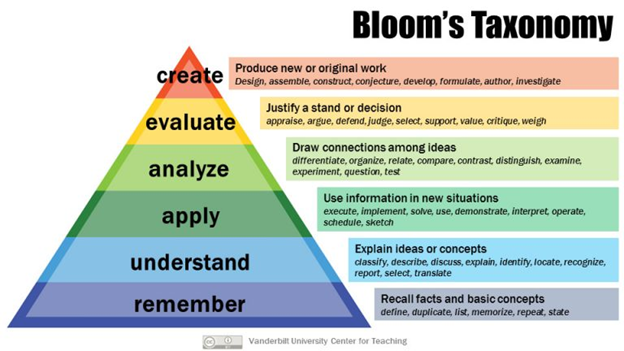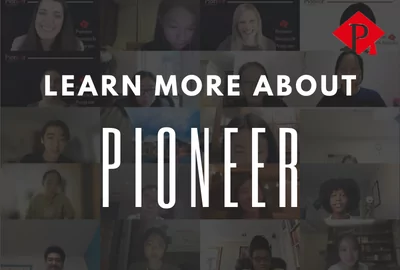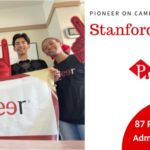An important feature of the Pioneer Research Program is its focus on the use of knowledge to find solutions to the world’s problems. No matter the research concentration, Pioneer scholars are supported in deepening their understanding of an issue and exploring the ways it may be addressed. This lies in contrast to learning environments that rely on traditional testing to measure student learning. Such an approach places a strong emphasis on students’ ability to remember and understand, the first two levels of cognitive learning on Bloom’s revised taxonomy. ①

The Pioneer Research Program, however, calls on students to utilize all six levels identified in Bloom’s: remember, understand, and apply, analyze, evaluate, and create. From participating in cohort sessions and selecting paper topics to conducting research and writing their papers, Pioneer scholars are using these higher-level cognitive skills throughout their experience in the program.
Pioneer scholar Ezgi (astronomy, 2019), from Turkey, shared that her cohort sessions focused on the application of knowledge. Learning how to apply a mathematical tool to physics was particularly valuable to her. “[In school] I had learned a lot of mathematical tools but not how to apply them,” she said. “Pioneer showed me how to use these tools…and apply them to topics I am interested in.”
Applying mathematical tools is one way Pioneer scholars apply new knowledge. Pioneer scholar Molly (philosophy, 2020) from the United States, applied her knowledge of philosophy to the context of parenting. She did so by looking specifically at the effect of abusive parents on the upbringing of a child through Plato’s perspective, since that was one of the topics of her cohort sessions that she found most engaging. “I never would have seen my paper take that direction,” she said, “but it was through the help of my professor who studied the material intensely that got me to that place.”
Neha (international relations, 2019), a Pioneer scholar from the United States, illustrated how, in addition to the skills of understanding and application, two other aspects of Bloom’s revised taxonomy—analysis and evaluation—were fundamental to her learning. Neha explained that the first draft of her research paper was extremely long because all of the risks she’d identified to the Venezuelan economy were so closely interconnected. Her faculty mentor helped her narrow down key issues and prioritize them.
“My Pioneer professor used their background in analyzing years of history and years of risks to other countries to suggest which of these risks would have the most practical implications, the biggest implication,” she said. Neha believes this ability to conduct deep analysis will help her contribute to other fields and answer questions like: Which disease needs to be treated first? Which economic issue needs to be dealt with? This is “really important in the context of bigger world problems,” she added.
Michael (mathematics, 2019), a Pioneer scholar from the United States, emphasized his use of the highest level on Bloom’s revised taxonomy, create, in the program. “The creativity comes when you have to kind of think about all of the methods [to] solve a particular problem that you’ve learned over the years and you have to choose which one to apply because there’s plenty of ways to do it that are all equally valid,” he said. Michael also spoke about how, in some formal education environments, this kind of creative approach to problem-solving isn’t used due to the constraints of large classrooms and other concerns about the efficacy of learning in this way. However, he explained how creativity served him well in his Pioneer experience. “You have to think of unique ways to kind of interpret the problem,” he said. “Maybe there’s some sort of insight that you can leverage to solve a different way that no one’s ever thought of before…[In the Pioneer Academic Program] you’re free to explore these different approaches.”
Pioneer scholar Fredrick (international relations, 2020), from Kenya, also demonstrated the cognitively demanding skill of creating. Frederick chose to study restorative justice and preventative measures toward ethnic conflict for his research paper, a strategic decision related to his future career plans. He believes this knowledge set will serve him in his future career in STEM which will demand the creation of novel solutions that take into account a variety of cultural and societal factors. He shared, “there is a space to connect the two because at the end of the day, if you are in an institution that’s trying to reach the African continent, even if I do end up majoring in Engineering, I still feel that I will benefit, that my career will benefit from that background.”
Pioneer scholar Harshika (environmental studies, 2019), from India, is planning to continue studying computer science in college but within the context of environmental protection. This is another example of how a Pioneer scholar will use creativity in her future plans, studying how the creation of machines using robotics technology can be used to address environmental damage to coral reefs. “I want to combine my passions for computer science and environmental science,” she shared. “Today technology plays a big role in protecting the environment. That’s what I found out through my research. When I looked at technologies like CRISPR and genetic engineering, I realized that technology plays a big role in benefitting society and the environment.”
Pioneer Academics provides fertile ground for scholars to make use of the entirety of Bloom’s revised taxonomy. Scholars engage with these higher-order cognitive skills—remember, understand, apply, analyze, evaluate, and create to expand their knowledge base and develop innovative ways to address the world’s most pressing problems.
① “Bloom’s Revised Taxonomy.” Assessment, Colorado College, 17 Dec. 2020, https://www.coloradocollege.edu/other/assessment/how-to-assess-learning/learning-outcomes/blooms-revised-taxonomy.html.


 Doing research is commonplace.
Doing research is commonplace.


